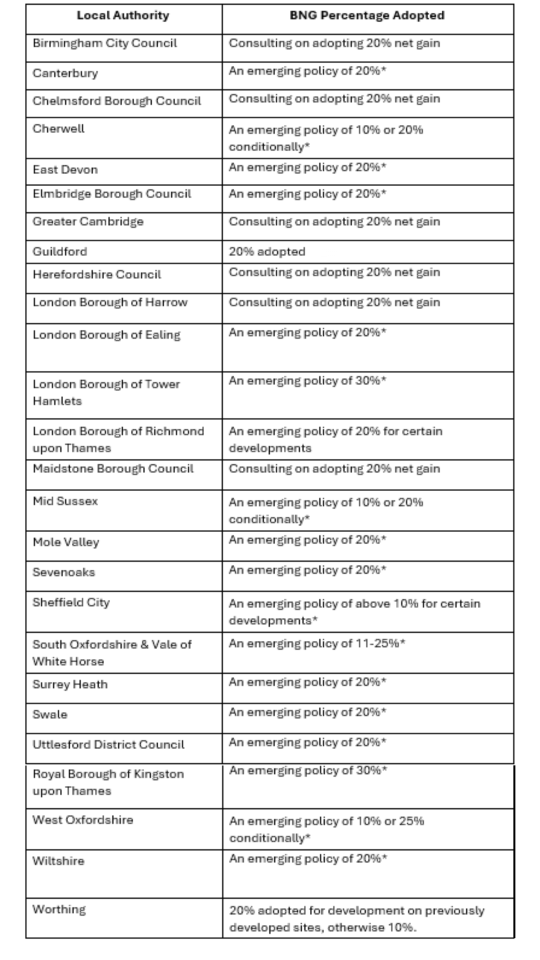7 February 2024
Ahead of roll out of mandatory Biodiversity Net Gain (BNG) on 12 February, Wildlife and Countryside Link (Link) has released new analysis revealing that in most Local Authorities, Biodiversity Net Gain will fail to go beyond “offsetting”. The scheme requires developers to create new habitat to compensate for harm to nature in new developments.
The Environment Act 2021 allows Local Authorities to set net gain requirements above 10% in their Local Plans. However, nature organisations say that the vast majority of local authorities are set to go no further than mandatory 10% Biodiversity Net Gain minimum requirements.
The Government’s Impact Assessment acknowledged that 10% BNG may not go beyond “no net loss” and Tony Juniper, Chair of Natural England, said last week that “biodiversity net gain is really about keeping things as they are”.
Based on Freedom of Information requests sent to the 317 local authorities in England, the figures show that just 26 local authorities (8%) have either committed to, or are considering, BNG requirements above the mandatory requirement of 10%.
Further key findings from the study. Out of 317 local authorities in England [2]:
See the table in the notes to editors for the local authorities with the most ambitious BNG plans. [3]
Richard Benwell, CEO of Wildlife and Countryside Link, said: “We really welcome the introduction of mandatory net gain. Done well, it could help turn around the decline of species and habitats, from dormice and red squirrels to meadows and woodlands, and give communities more natural spaces to enjoy.
“But the law is too lenient. It will make no dent at all in the £5bn annual gap in funding for nature recovery. Added to concerns about Local Authorities’ capacity to enforce the rules, there’s real concern that net gain will only amount to a glorified offsetting scheme. While 10% may help prevent a decline, Government must support much higher ambitions to restore nature.
“The local success stories revealed today show that there’s real appetite among Local Authorities to go further for nature, but there’s a real risk that without support many areas lose out on this opportunity. The Government should publish clear guidance to support Local Authorities to go further for nature and raise the bar for biodiversity net gain.
Rebecca Pullinger, Lead Policy Advocate in the Woodland Trust’s conservation team, said: “Nature is in crisis, with for example, just 9 per cent of our woods are in good ecological condition. We need an ambitious approach to turn this around. Done well, Biodiversity Net Gain could be part of this, but a 10% gain is not enough. Government must empower local authorities to raise the bar – by providing clear guidance to local authorities on how this can be done. A bold approach is needed to inspire the vital protection, restoration and creation of nature rich habitats for the benefit of communities and wildlife across the country.”
Developers have been providing less green space as part of new developments over past decades, resulting in fewer green spaces for residents of newer developments to enjoy. BNG could turn this around as it aims to ensure that after a development project like housebuilding, the natural environment is left in a better state than it was before, for example by creating new habitats such as woodland or by restoring areas such as wetlands. Benefits of this include more homes for declining wildlife, boosting public health through access to nature spaces, and helping protect communities against extreme weather including floods and heatwaves.
But nature experts have warned that 10% is too low to achieve a net gain in habitat and wildlife populations. The Chair of Natural England, Tony Juniper, acknowledged this publicly in January, saying 10% BNG was ‘about keeping things as they are’ and may not deliver a net gain for nature.
Recommendations from environment experts for Government to ensure that BNG delivers for nature:
ENDS
Notes to Editors:
Table 1: Local Authorities implementing or considering the most ambitious Biodiversity Net Gain policies.

*Emerging policies are those proposed within regulation 18 or 19 draft local plan consultations.



Latest Press Releases